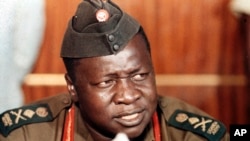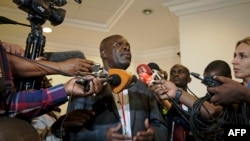The efforts to memorialize Amin are being led by Hassan Kaps Fungaroo, a former lawmaker from the late president's home region.
Amin, took office by force in 1971 and led Uganda until 1979 when he was removed by armed groups of exiles.
The East African leader died in Saudi Arabia in 2003.
Amin's passing was barely acknowledged in Uganda, and some of his supporters over the years have unsuccessfully lobbied for his remains to be returned home, underscoring his tainted legacy.
Fungaroo says Amin was defamed by international reporters who sometimes falsified stories about him.
In September, the former lawmaker planned a lecture on Amin's legacy but failed to receive approval to host it from Uganda's education ministry.
Fungaroo later wrote to Ugandan authorities requesting support for the creation of the Idi Amin Memorial Institute — a matter that reached President Yoweri Museveni's office.
Museveni led a rebel group that was among those that ousted Amin with the help of Tanzanian troops. He regularly dismisses Amin, and once described the former leader as "a primitive dictator."
In response to Fungaroo's proposal, Museveni said "it is not acceptable to license an institute to promote or study the work of Idi Amin."
"It is enough that forgiving Ugandans forgave the surviving colleagues of Idi Amin. Let that history be forgotten," he added.
Museveni's verdict sparked rebuttals from Ugandans who see similarities between him and Amin.
Like Amin, Museveni took power by force and is heavily reliant on military authority to remain in power.
Museveni's critics argue that he has no moral authority to judge Amin, citing several challenges that have happened under his leadership, among them, rampant corruption, abuse of public resources, police brutality, and the shrinking space for opposition leaders.
Joel Ssenyonyi, a Ugandan lawmaker and spokesperson for the opposition National Unity Platform party, said "Mr. Museveni thinks this country started with him and that he has performed miracles."
"Our past leaders made mistakes, without a doubt, which Museveni likes to capitalize on, but he has done worse," Ssenyonyi added.
While Amin was a semi-illiterate leader who never pretended to be a democrat, Museveni has "captured all institutions" in the course of nearly four decades in power, the opposition lawmaker said.
Gerald Bareebe, a Ugandan academic who is an assistant professor of politics at York University in Canada said "the debate surrounding the proposed Amin institute shows how Museveni's rule has polarized Ugandans."
"While many Ugandans abhor Amin, there are some who see similarities with Museveni's rule, especially given the rising cases of forced disappearance, torture, extra-judicial killing and detention without trial under Museveni's regime," Bareebe added.
Responding to online criticism of Museveni's directive, Ofwono Opondo, Uganda's government spokesman said a memorial of Amin may "glorify him but cannot undo his terrible deeds done in full view of many people, some still alive."
The suggested institute is an attempt to "whitewash" Amin's legacy, Opondo said.
Amin's supporters and some academics point out that the former leader was instrumental in acquiring or maintaining national assets at home and abroad, including a railway service, a national carrier, and multiple buildings housing Uganda's foreign missions. They say he also was committed to the nurturing of local talent in music and sports.
Despite the sentiments passed that favor Amin, his crimes are widely documented.
A one-time heavyweight boxing champ and soldier in the British colonial army, Amin seized power in a coup d'état and then became the paranoid dictator whose government was accused of carrying out extrajudicial killings, forced disappearances and public executions.
Between 100,000 and 500,000 people were killed during Amin's rule, according to Human Rights Watch.
Some of Amin's actions drew harsh international attention upon Uganda. In 1972 he ordered the expulsion of tens of thousands of Asians who had controlled the country’s economy, sparking economic chaos.
In the most notorious international incident of Amin's reign, a Palestinian group hijacked an Air France airliner to Uganda's Entebbe Airport in 1976 and kept its Israeli passengers as hostages. Israeli commandos flew to Entebbe under cover of darkness and rescued the captives, with Amin claiming he wanted to help negotiate a peaceful resolution despite some evidence he had been collaborating with the hijackers.
Amin had almost no allies in the international community at the time he lost power. He fled to Libya, then Iraq and finally Saudi Arabia, where he was allowed to quietly settle down.
Yet Museveni, whose government regularly receives substantial foreign aid, insists that Uganda would be stronger economically if Amin had never been president.
Some Ugandans disagree with Museveni and argue that he has had plenty of time to make his own mark.















Forum